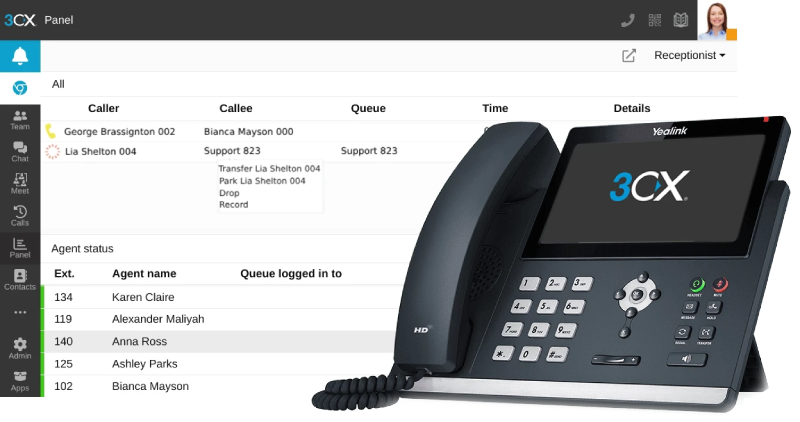Despite everything that happened in 2020, contact centers remain a vitally important way for businesses to connect with customers. However, things are changing. Technologies are advancing, communication trends are shifting, and customers are more demanding than ever before.
To ensure your business doesn’t fall by the wayside, check out the five biggest contact center trends that we predict in 2021 and beyond…
1. The New Normal of Remote Working

Due to the current COVID climate, remote working has become a necessity rather than a luxury. In a recent survey, 74% of business owners said that all employees at their company are now working remotely, compared to just 7% before the pandemic.
As well as providing flexibility for businesses, remote working can also boost morale and efficiency. That’s why most companies are likely to continue to embrace remote working in 2021, even if it’s not full-time.
It’s predicted that most modern contact centers are planning for a hybrid model of working going forward – that is, combining remote and office-based working.
2. The Increase In Live Chat

During Covid-19 lockdowns, some industries witnessed a huge spike in customers using live chat software; Inference Solutions found that 71% of IT decision-makers agree that intelligent self-service automation helped their organization remain agile during Covid-19.
Live chat provides immediate answers to queries, and this immediacy is likely why customer satisfaction ratings tend to be higher for live chat than other types of support. Automated live chat can be used to answer common customer queries about prices and opening times, and common product questions. This allows your customer service team to deal with other issues within the business, resulting in a more productive workforce.
According to Forrester, customers who use live chat are 2.8 times more likely to convert than those who don’t, and a buyer who uses this software will spend 60 times more money on average. This is because live chat puts customers at ease who have never previously purchased the product or service, while minimizing purchasing errors. Lastly, having your customer support constantly available via live chat helps to build trust and gives customers that further confidence to try your product.
3. Customers Preferring a Personalized Experience
In the same way customers want quicker response times, they also want a more personalized experience. In fact, 80% of customers are more likely to purchase a product or service from a brand that provides personalized experiences.
You can make your customer service more personalized in many ways. You should regularly use the customer’s name, and gather as much information about their query as possible before responding to avoid miscommunication issues. Another suggestion would be to develop a frequent communication strategy, such as follow-up ‘thank you’ emails.
Providing personalized experiences can also improve the performance of your business – it can reduce customer acquisition costs by 50%, boost revenue by 5%-15%, and increase marketing spend efficiency by up to 30%.
4. Demand for Multiple Customer Service Channels
In this digital age, businesses that only communicate via telephone or email are at risk of falling behind the competition. Customers now expect to communicate with businesses through multiple channels, which are also known as ‘customer touch points’.
Phone calls are becoming less popular. Today, 64% of people would rather message than call a business, which is why we expect contact centers to start investing in other channels such as instant messaging, SMS messaging, and social media.
Using more channels means more opportunities to help customers. However, in order to be truly successful, there must be a good level of cohesion between all of your different channels.
This can be done by using a UCaaS (unified communications as a service) software, which can help agents switch between channels quickly, or by researching exactly which channel you know each customer would prefer to be contacted with. Doing so should help to create a more seamless customer experience.
5. A Move Towards Cloud-Based Technologies
The shift towards remote working means many businesses now rely on cloud-based technologies rather than physical, on-premises hardware. This is because cloud computing enables staff to access contact center systems from anywhere in the world, as long as they have an internet connection.
We’re also forecasting cloud computing in contact centers because it can help to reduce costs. This software offers set monthly subscriptions, which means you only pay for what you need, while it also helps keep your customer data more secure than traditional, on-site data centers can, which can help you avoid any PR disasters related to customer data breaches.
Contact Center Trends: The Roundup
As if keeping up with the latest technologies wasn’t tricky enough, you also need to keep pace with ever-changing customer demands. Consumers want personalized messaging across multiple channels, without having to wait too long for a response.
It may sound like a lot to handle, but as long as you plan for these trends and invest in the right contact center software, you’ll be on the right track for happier customers, more motivated staff, and better business performance.
Dan is a Senior Writer at Expert Market, specializing in digital marketing, web design, and photocopiers, amongst other topics.
Original post: https://www.3cx.com/blog/unified-communications/5-contact-center-trends/





